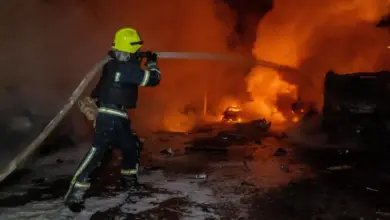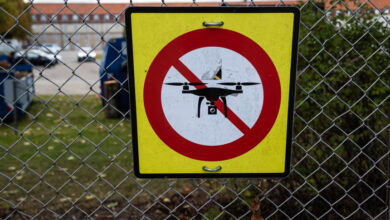Ras Lanouf, Libya — Libya's rebel forces closed in Monday on Muammar Qadhafi's hometown of Sirte, the gateway to the western half of the country, after it was targeted for the first time by international air strikes.
Celebratory gunfire broke out in the early hours of the morning in the rebel city of Benghazi amid rumors that Sirte had already fallen without a fight. The report could not be confirmed and premature accounts of rebel victories are not uncommon in the struggle for Libya.
Witnesses in the city said that bombing could be heard around 6:30 AM local time but there was no fighting in the streets or signs of rebel forces.
Libya's rebels have recovered hundreds of kilometers of flat, uninhabited territory, including two key oil installations, at record speeds after Qadhafi's forces were forced to pull back by international air strikes.
A heavy bombardment of Tripoli also began late Sunday, with at least nine loud explosions and anti-aircraft fire heard, an Associated Press reporter in the city said.
Earlier in the day, rebels regained two key oil complexes along the coastal highway and promised to quickly restart Libya's stalled oil exports, prompting a slight drop in the soaring price of crude oil to around US$105 a barrel.
Moving quickly westward, the advance retraced their steps in the first rebel march toward the capital. But this time, the world's most powerful air forces have eased the way by pounding Qadhafi's military assets for the past week.
Sirte is strategically located about halfway between the rebel-held east and the Qadhafi-controlled west along the Mediterranean coast. It is a bastion of support for Qadhafi and was expected to be difficult for rebels to take.
If the city has fallen, it would mark a major victory for the rebels and leave the way open to Tripoli and Misrata, the sole rebel outpost remaining in the west of the country.
In Misrata, residents reported fighting between rebels and Qadhafi loyalists who fired from tanks on residential areas. Misrata is one of two cities in western Libya that have risen against the regime and suffered brutal crackdowns. It is located between Tripoli and Sirte on the coastal road.
In Washington, Defense Secretary Robert Gates said he could not offer a timetable for how long the Libya operation could last, as the Obama administration tried to bolster its case for bringing the United States into another war in the Muslim world.
The UN Security Council authorized the operation to protect Libyan civilians after Qadhafi launched attacks against anti-government protesters who demanded that he step down after nearly 42 years in power. The airstrikes have crippled Qadhafi's forces, allowing rebels to advance less than two weeks after they had seemed at the brink of defeat.
The assault on Sirte, where most civilians are believed to support Qadhafi, however, potentially represents an expansion of the international mission to being more directly involved with regime change.
"This is the objective of the coalition now, it is not to protect civilians because now they are directly fighting against the armed forces," Khaled Kaim, the deputy foreign minister, said in the capital, Tripoli. "They are trying to push the country to the brink of a civil war."
Now that the rebels have regained control of two key oil ports, they are making tentative plans to exploit Libya's most valuable natural resource. But production is at a trickle, the foreign oil workers and their vital expertise have fled the country, and even talk of a marketing deal with Qatar seems murky at best.
The coastal complexes at Ras Lanouf and Brega were responsible for a large chunk of Libya's 1.5 million barrels of daily exports, which have all but stopped since the uprising that began 15 February and was inspired by the toppling of governments in Tunisia and Egypt.
The agreement with the tiny Gulf nation of Qatar could allow the rebels to exploit Libya's vast oil reserves — most of which are in the eastern territory they control. With no ships coming or going, Libya's tanks are full to the brim. Until they are emptied, there's nowhere to store any oil that is pumped from the ground.
Eastern oil officials said over a week ago they were still producing about 100,000 barrels per day from two key fields. But it was unclear whether such levels were sustainable given the security problems across the country and the exodus of foreign workers from the vital sector.
The rebel turnaround is a boost for President Barack Obama, who has faced complaints from lawmakers from both parties that he has not sought their input about the US role in the conflict or explained with enough clarity about the American goals and exit strategy.
Pentagon officials are looking at plans to expand the firepower and airborne surveillance systems in the military campaign, including using the Air Force's AC-130 gunship armed with cannons that shoot from the side doors, as well as helicopters and drones.




